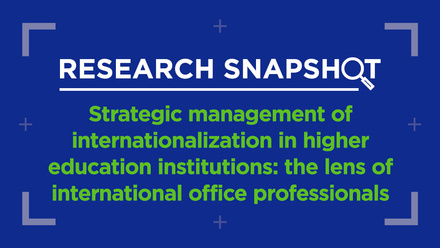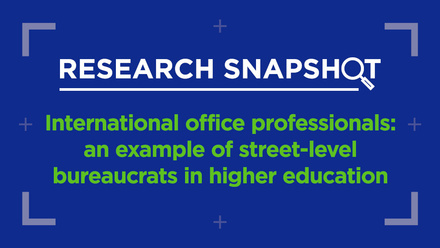Comprehensive records are key to successful alumni strategies

Although the set up and scope of alumni relations offices may differ from country to country, there is an unmistakable trend across the board that alumni relations are becoming more and more integrated in the primary processes of higher education organisations. The increased scope of services and functions of these offices demand specific skills and competences of their managers and one aspect crucial to the success of alumni relations is an efficient way of managing alumni details.
A well functioning alumni relations office for higher education institutions is essential. Through alumni, the recruitment of (international) students can be increased. Alumni can support current students with their career planning through alumni mentorships and coaching, and they can provide internships or offer job positions. Alumni are important for their input on the quality of your institution’s educational programmes and research. Additionally, by keeping track of your alumni you can measure the employability of your graduates.
Fundraising and sponsoring are also becoming important parts of alumni networking as higher education institutions seek new ways of establishing public-private partnerships due the continuous decrease of government funding. Young alumni have different needs and aspirations compared to established senior alumni, which means different activities and communication tools need to be developed. To get in touch and maintain contact with your alumni, a comprehensive customer relationship management system is essential.
Alumni records rule
Finding a successful and efficient way of recording important details about your alumni is essential. What are considered to be good alumni records? What’s the best way to store and manage alumni records? How do you create a system which enables you to maintain valid alumni contact information?
I was recently approached by a colleague from the International CASE Alumni Relations Survey (ICARS) team, to clarify some survey numbers. My institution has participated in this survey for several years and finds it very useful for benchmarking our alumni engagement and overall alumni relations programmes’ performance. The colleague from ICARS wanted to double check how many alumni in our system of records have valid career information and how many of them can be reached. It appeared that 75-80% of career information (valid within the last two years) and 85-90% of addressable alumni (via email, telephone or postal address) – which our institution recorded – were considered to be very high by ICARS. Appreciating the differences in size of institutions, their history, geographic and professional diversity among alumni, and other relevant factors, I believe that alumni records is one of the key factors in robust alumni programming.
Data mining or data scoop?
Depending on your starting point, knowing just the names of your alumni and their graduation years might be an achievement. Many start-up programmes would have good biographical records, but would need to do more in terms of alumni contacts and their career details. Some time ago the term ‘data mining’ was widely used by colleagues from European universities. I would argue, however, that nowadays with technological advances and social media proliferation, the term ‘data scoop’ or ‘data scan’ is more appropriate. Until we are dealing with particular generation and/or culturally peculiar group of alumni, there is not so much need to dig deep and ‘mine’ anymore. Today, many of us are more concerned with the volume of potentially useful/valid data and the way to assess and transfer it, rather than finding information. It appears, for example, that the more solutions there are for possible social media or publicly available online information synchronisation with your alumni records, the more data quality, assessment, protection and authorisation questions are being asked.
Some major commercial database players, as well as in-house developed systems are getting more complex to reflect on the variety of programme tools and activities, which many institutions utilise for their alumni programmes. I have worked with the products of arguably two of the biggest commercial database providers, as well as with an in-house developed system. Being a humble student of these systems, I have learnt to appreciate simplicity rather than complexity and keeping the mission of my institution in mind, while making decision on what data do we really need and how to manage it efficiently.
By Serge Sych, Central European University, Budapest, Hungary
Alumni records and many other aspects of modern alumni relations management will be addressed in the EAIE Academy training course on ‘Alumni Relations from A to Z’ which will be held from April 20 to 22 in Riga, Latvia.







